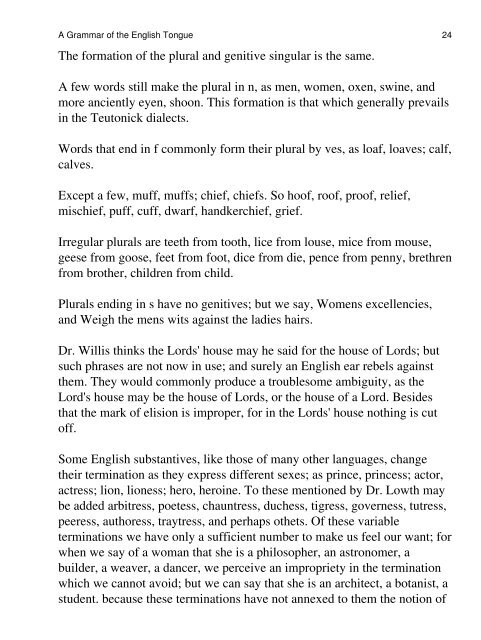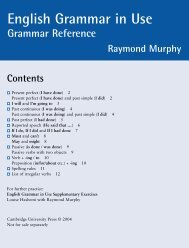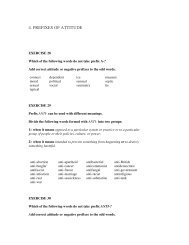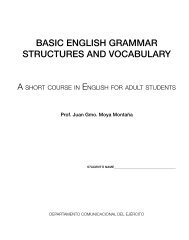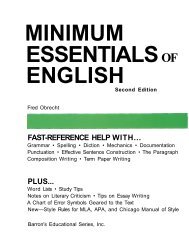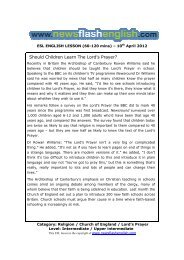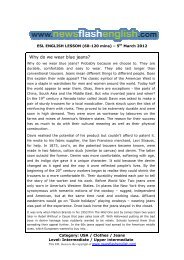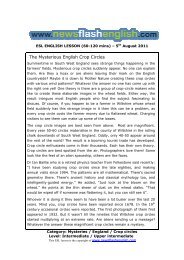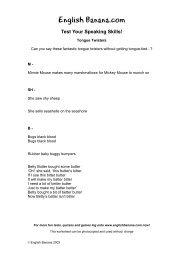A Grammar of the English Tongue - ESL Teachers Board
A Grammar of the English Tongue - ESL Teachers Board
A Grammar of the English Tongue - ESL Teachers Board
You also want an ePaper? Increase the reach of your titles
YUMPU automatically turns print PDFs into web optimized ePapers that Google loves.
A <strong>Grammar</strong> <strong>of</strong> <strong>the</strong> <strong>English</strong> <strong>Tongue</strong> 24The formation <strong>of</strong> <strong>the</strong> plural and genitive singular is <strong>the</strong> same.A few words still make <strong>the</strong> plural in n, as men, women, oxen, swine, andmore anciently eyen, shoon. This formation is that which generally prevailsin <strong>the</strong> Teutonick dialects.Words that end in f commonly form <strong>the</strong>ir plural by ves, as loaf, loaves; calf,calves.Except a few, muff, muffs; chief, chiefs. So ho<strong>of</strong>, ro<strong>of</strong>, pro<strong>of</strong>, relief,mischief, puff, cuff, dwarf, handkerchief, grief.Irregular plurals are teeth from tooth, lice from louse, mice from mouse,geese from goose, feet from foot, dice from die, pence from penny, brethrenfrom bro<strong>the</strong>r, children from child.Plurals ending in s have no genitives; but we say, Womens excellencies,and Weigh <strong>the</strong> mens wits against <strong>the</strong> ladies hairs.Dr. Willis thinks <strong>the</strong> Lords' house may he said for <strong>the</strong> house <strong>of</strong> Lords; butsuch phrases are not now in use; and surely an <strong>English</strong> ear rebels against<strong>the</strong>m. They would commonly produce a troublesome ambiguity, as <strong>the</strong>Lord's house may be <strong>the</strong> house <strong>of</strong> Lords, or <strong>the</strong> house <strong>of</strong> a Lord. Besidesthat <strong>the</strong> mark <strong>of</strong> elision is improper, for in <strong>the</strong> Lords' house nothing is cut<strong>of</strong>f.Some <strong>English</strong> substantives, like those <strong>of</strong> many o<strong>the</strong>r languages, change<strong>the</strong>ir termination as <strong>the</strong>y express different sexes; as prince, princess; actor,actress; lion, lioness; hero, heroine. To <strong>the</strong>se mentioned by Dr. Lowth maybe added arbitress, poetess, chauntress, duchess, tigress, governess, tutress,peeress, authoress, traytress, and perhaps o<strong>the</strong>ts. Of <strong>the</strong>se variableterminations we have only a sufficient number to make us feel our want; forwhen we say <strong>of</strong> a woman that she is a philosopher, an astronomer, abuilder, a weaver, a dancer, we perceive an impropriety in <strong>the</strong> terminationwhich we cannot avoid; but we can say that she is an architect, a botanist, astudent. because <strong>the</strong>se terminations have not annexed to <strong>the</strong>m <strong>the</strong> notion <strong>of</strong>


